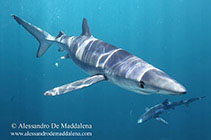| Family: |
Carcharhinidae (Requiem sharks) |
| Max. size: |
400 cm TL (male/unsexed); max.weight: 206 kg; max. reported age: 20 years |
| Environment: |
pelagic-oceanic; brackish; marine; depth range 0 - 1082 m, oceanodromous |
| Distribution: |
Circumglobal in temperate and tropical waters. Western Atlantic: Newfoundland, Canada to Argentina. Central Atlantic. Eastern Atlantic: Norway to South Africa, including the Mediterranean. Indo-West Pacific: East Africa to Indonesia, Japan, Australia, New Caledonia, and New Zealand. Eastern Pacific: Gulf of Alaska to Chile. Probably the widest ranging chondrichthyian. Highly migratory species. |
| Diagnosis: |
Dorsal spines (total): 0-0; Dorsal soft rays (total): 0-0; Anal spines: 0-0; Anal soft rays: 0-0. A slim, graceful blue shark with a long, conical snout, large eyes, and curved triangular upper teeth with saw edges; pectorals long and narrow; no interdorsal ridge (Ref. 5578). Dark blue dorsally, bright blue on the sides, white ventrally (Ref. 5578). Tips of pectoral fins and anal fin dusky (Ref. 9997). The first case of diprosopus tetrophthalmus (cranofacial duplication) in a foetus of this species was reported from South Atlantic (Ref. 119190). |
| Biology: |
Oceanic, but may be found close inshore where the continental shelf is narrow (Ref. 6871, 58302). Usually found to at least 150 m (Ref. 26938). Maximum size from Ref. 128029. Reported from estuaries (Ref. 26340). Epipelagic, occasionally occurs in littoral areas (Ref. 58302). Feeds on fishes (herring, silver hake, white hake, red hake, cod, haddock, pollock, mackerel, butterfish, sea raven and flounders (Ref. 5951)), small sharks, squids, pelagic red crabs, cetacean carrion, occasional sea birds and garbage (Ref. 5578). Viviparous (Ref. 50449). Sexual dimorphism occurs in skin thickness of maturing and adult females (Ref. 49562). May travel considerable distances (one specimen tagged in New Zealand was recaptured 1,200 km off the coast of Chile) (Ref. 26346). Potentially dangerous to humans (Ref. 6871, 13513). Marketed fresh, dried or salted, and frozen; meat utilized for consumption, hides for leather and fins for soup (Ref. 9987). Sexually mature at 250 cm long and 4-5 years old. The female gives birth up to 80 young measuring 40 cm long, gestation lasts almost a year (Ref. 35388). Produces from 4 to 135 young a litter (Ref. 26938). Minimum depth from Ref. 125614. |
| IUCN Red List Status: |
Near Threatened (NT); Date assessed: 06 November 2018 (A2bd) Ref. (130435)
|
| Threat to humans: |
traumatogenic |
Source and more info: www.fishbase.org. For personal, classroom, and other internal use only. Not for publication.

